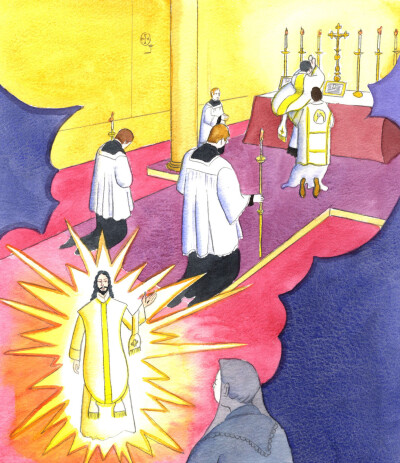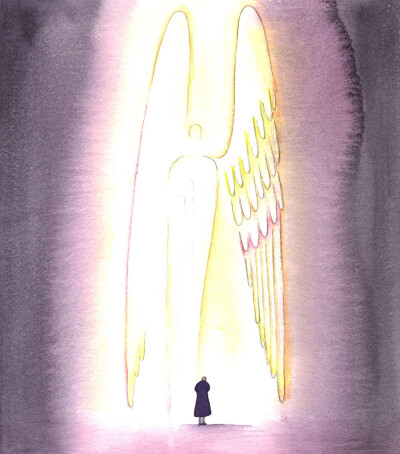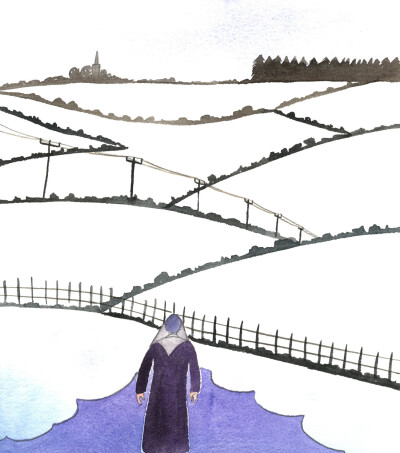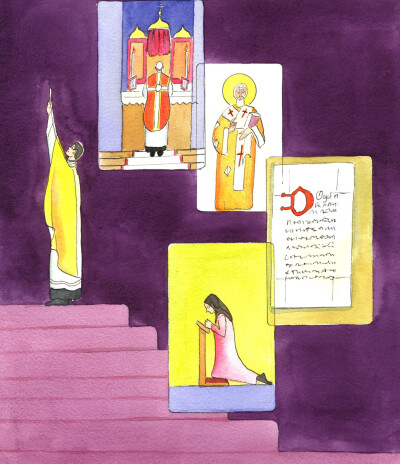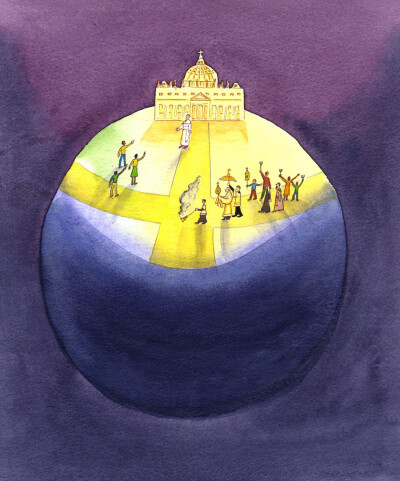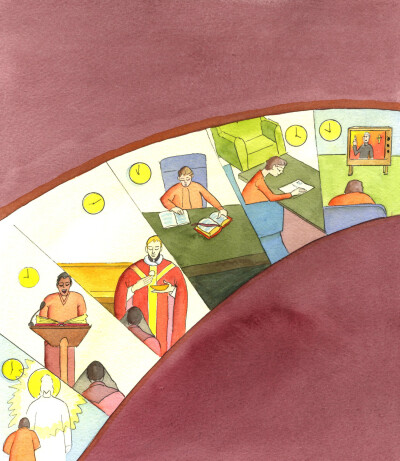Search Page
Showing 61 - 80 of 90
Christ deserves to be shown the deepest honour at Mass. Christ is touched by the deep reverence which is shown out at every Mass where people who love Christ take care that every word and gesture is dignified and worthy of their Divine Saviour. We should not offer, at Mass, words, gifts or gestures that are introduced merely to make children, or other people, feel special.
Christ looks on with joy, with His Saints, His heart grateful that some of His flock revere the Traditional Mass - now called the Extraordinary form of the Rite - and that some priests offer it, and some of the laity assist because of their love for Christ, first of all;but also because of their desire to support and encourage priests who revere ancient ways.
What Christ told us is true, that there is only one Way to Heaven: His Way, which is like a road we travel safely when we have received his life in Baptism and have been freed from sin. If people are not willing to revere Christian Tradition they are not acting as true children of God, for example, Christians who are searching for another Way.
The Church reminds us, in Sacred Scripture and the Sacred Tradition, that God has given us Angels to guard us. If we are in spiritual, moral or physical danger, and call on their aid, they will help us, though we are not usually privileged to witness their presence. We are weak, and God loves to help us in all sorts of ways.
We need to refocus our thoughts: on Heaven! Someone sad can gain a new perspective, by looking at a traditional scene, and realising that he or she enjoyed many more happy Christmasses than sad ones. What counts is to realise that in every season we are deeply loved by God, as precious individuals whom He wants to bring to enjoy eternal joy with Him.
Long ago, the new rite of the Mass was very hurriedly introduced. Through long-standing, tragic ignorance of the Traditional Mass, many people have lost the sense of ascending, together, to Calvary, to offer the Holy Sacrifice. The Traditional rite seemed to be put aside, and the Novus Ordo was in place. But now (in 2010) Christ is encouraging, through the Papacy, a growth in understanding, at last, of the beauty and antiquity of the Traditional Mass, and of its reverent phrasing, and its silences.
Every valid Mass is holy, and admirable; yet the Traditional Mass, now called the 'Extraordinary Form', is admirable especially for its beauty, its antiquity, its reverent phrasing, and its silences which are so little found today. All of these aspects lead us to approach the Father in a spirit of holiness.
God is enabled to act powerfully upon the earth, wherever people are willing to carry out His wishes, and so to fulfill His plan to lead us to holiness; yet His plans are delayed or stopped, on earth, where Catholics raise their voices, and challenge faithful Clergy members who are faithfully handing on the Faith in its fullness. Those who dissent on faith or morals undo God's work, unlike Catholics in the new Movements or Orders, or following in traditional ways, who persevere no matter what the cost.
Christ has told the Church, through His Pope, our Pope Benedict, that priests are free to offer the Mass in the Extraordinary (Traditional) form; yet many Bishops have shown reluctance to welcome this instruction; or they still make it difficult for lay-persons to find such a type of Mass with its beauty and reverence.
We should rejoice, if we have the relics of a Saint amongst us. We should ask for the prayers of the Saints, and receive their wonderful help, which is God's help poured through them. No matter how little-known some are, each Saint is now glorious in Heaven, and is a powerful intercessor for members of the Church: for those of us on earth, and for those in Purgatory.
Both forms of the Mass (Ordinary and Extraordinary) are a legitimate part of the life of the Church; both unite us with the same Sacrifice of Calvary; both give glory to Almighty God and allow the sanctification of his people.
Christ hears all sorts of prayers. Some people show their love for Christ by praying usually with very flowery language: very formal, or poetical or elegant. It springs from the traditions of their family or country. Others, brought up by plain-speaking parents, pray simple, honest, reverent prayers with no clever words but much love. We must not worry, about our simple prayers, since Christ said in the Gospel, 'Let your Yes be Yes and your No be No.' He likes our simplicity, just as He likes the beautiful words that other people offer, too.
It is only reasonable to believe the evidence of our eyes and ears. If we saw blood flowing in a gutter, we would search the road for an injured body, and would find it. If we see plain evidence that hundreds of thousands of Catholics have abandoned their vocations, or left the Church, we are sensible if we look back, to find the cause. It lies in the aftermath of the Second Vatican Council, in the exaggeration, rebellion, dissent, and selfishness that cause traditional teaching and liturgy to be despised.
God has revealed Himself to us through His Son Jesus Christ; and Catholics know that we can rely on Sacred Scripture, the Sacred Tradition, and the Magisterium, to receive the truth handed down to us. We can hear, receive, treasure, and then share the Word of God in ordinary little ways throughout the day.
No-one is exempt. At the end of time, God will bring the 'dead' to life. Everyone has to account to God, at death, for his life and behaviour; but in the end, everyone will rise to hear the Last Judgement of God, as described in Sacred Scripture and the Tradition. We can be glad if we have tried to serve God in humility, and if we have helped other people towards holiness by our intercessions, in earthly life.
Holiness, by Elizabeth Wang
This text is the complete version of the pamphlet entitled 'SPEAK ABOUT HOLINESS'. It is based on a talk given by Elizabeth Wang.
Preface.
This little book contains the full version of the text I …
What is Mary Like? by Elizabeth Wang
This text is the complete version of the pamphlet WHAT IS MARY LIKE?
“Now having met together; they asked him, ‘Lord, has the time come? Are you going to restore the kingdom to Israel?’ He replied,…
The Purpose of the Priesthood, by Elizabeth Wang
‘The Purpose of the Priesthood contains encouragement and advice for Catholic priests. It reminds them about the central meaning of the Priesthood, and about the need to teach the Catholic Faith in it…
How to Pray: Preparation, by Elizabeth Wang
This text is published as Chapter 1 of How to Pray (Part One: Foundations), entitled 'How to Prepare'. An introduction to the life of prayer with much practical advice about how to deepen your prayer…
How to Pray: Perseverance, by Elizabeth Wang
This text is published as Chapter 3 of How to Pray (Part One: Foundations), pages 19-30, entitled 'How to Persevere'. An introduction to the life of prayer with much practical advice about how to deep…
Showing 61 - 80 of 90

